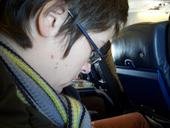I've just returned from my graduation last Monday and am finally starting to feel the effects of the completion of my university education. I was quite schocked to find that a considerable weight had been lifted from me, and not only that but a feeling of genuine contentment.
That is it, I feel free - no more panic about the looming thesis deadlines and the even more terrifying viva, none of that backstabbing that invariably accompanies competitive research environments. Were I back at the start of the PhD however, with the knowledge of how difficult it was, would I do it again?
Absolutely. The difficulty of the PhD, the stress of the bullying situation I was in, the financial issues, all of them together can't outweigh that feeling of acheivement that the experience gave me. I am by nature a very lazy person and will, if at all possible, avoid work - procrastination has become an art form for me. So I believe I have the right to feel proud - I have worked very hard for something I really wanted. It went against all my tendencies and urges to commit to something to that extent. I am very glad I did, I truly do love my work.
For those of you who still have no clue whatsoever what it is I actually work on, here's a quick explanation in the form of an everyday task:
- You're in the shower, the waters a bit on the cold side, so you decide to turn it up. Round goes the dial, but you're still thinking it's a bit cold, so you turn it further..
- OUCH! Too hot. You forgot that it takes some time for the hotter water to reach you.
- Quickly, you turn it down, making it a bit too cold, though not too far off, so you turn the dial much less.
- After a few little turns back and forth you get that *just right* temperature.
- OWWWWWWWWW....*&*$"£&($...what the %^&$ was that!?!
- Someone flushed the toilet ;)
This little story basically boils (harhar) down to this system:
- The process (the shower) to be considered
- The variable (the temperature) to be controlled
- The variable (the dial) to be manipulated
- The disturbance (the loo flushing)
- The controller (here this is you!)
Now, say for example, you'd prefer this system to be like this:
- You don't want to boil the skin off yourself
- You want to set a temperature for the water, not have to find that temperature yourself
- You want to make sure that the shower isn't affected by some div flushin the loo
This is where automatic control comes in. Automatic (a lil electronic chip, a few valves, etcetera) as opposed manual (you!). It can allow you to specify what you want (temperature in degrees Celsius for example), what you want to avoid (scalding water because of a change in water pressure for example) and how quickly or slowly you want to do it.
The simple answer would be a system of changes made that are similar to those of your own (i.e. move up to a temperature, realise it's too high and move back down, etcetera until you reach your target).
The better answer would be to know the system (for example, the range of temperature, or the delay of the delivery of hotter water) and be able to predict what you need to do..
And this is where I am - Predictive Control!

No comments:
Post a Comment